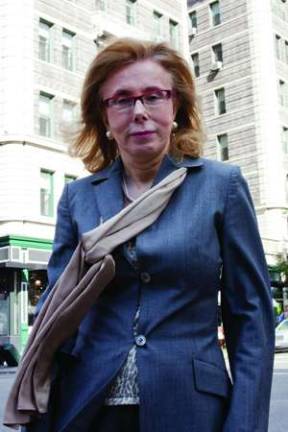Cooper Joins Hunt for City Council Seat

Debra Cooper has been around the political block, and now she's ready to start down the road of a City Council candidacy. Cooper is the latest to jump into the race to represent the Upper West Side district in 2014, when current Council Member Gale Brewer will be out due to term limits. Cooper has a history of fighting for progressive causes, and counts her experience winning elected office to serve on the state Democratic committee as a leg up on her opponents: Ken Biberaj, Marc Landis, Helen Rosenthal and Mel Wymore. "I campaigned back then, and I was out on the street at the time. I've done a lot of campaigning for other candidates in the district and elsewhere," she said. "I'm actually the only candidate who's ever run for and won something, so I think that does differentiate me." Her political convictions were founded early, Cooper said, based on her time growing up in Guilford, an idyllic Connecticut town that invested heavily in public education. "It was the epitome of what America could be, and it had a town hall form of government," Cooper said. "The town itself just evoked a sense of civic responsibility in me. I remember walking down the town green and thinking what a wonderful place America was-and that I was a feminist." Cooper convinced her parents, both Holocaust survivors who came to America and worked in factories to save enough money to move the family to Connecticut from an apartment above a grocery store in New Jersey, to send her to study at Brandeis University. She went on to earn a master's in education from Boston College and then moved to New York to study psycholinguistics, specializing in child language acquisition. She had also headed learning-disability programs at two public schools in Massachusetts before that. "I have a very extensive background in teaching and testing," Cooper said. "I do know a lot about standardized testing. I know their inadequacies. I know what they can measure and what they can't measure." After moving to the Upper West Side, Cooper married and had two daughters. She became active with the Stephen Wise Free Synagogue and with her children's schools, but she can pinpoint the day when she started to think about politics more broadly. "I became involved in political life in New York City two days after George H.W. Bush was elected," Cooper said. "The next day, I found out that the Reagan administration decided to ask the Supreme Court to overturn Roe v. Wade through the Webster decision. I had been marching for women's rights for a long time, I was very much a feminist." Cooper recalled that she was so distraught with the direction the country was taking that she walked into the headquarters of NARAL ProChoiceNY and offered her services as a volunteer; she eventually worked her way up to becoming a board member. With the support of Jerry Nadler, Scott Stringer and Linda Rosenthal, Cooper was elected to the state Democratic committee in 2006 and has been heavily involved in party politics. She's been active with Ansonia Independent Democrats, working on neighborhood issues from unionizing workers to preserving zoning. "I've been a leader on issues. I'm not afraid to tackle things that make other people uncomfortable. I wrote the resolution on the millionaire's tax when the governor was saying absolutely no way was he going to pass the millionaire's tax," Cooper said. One of the issues that Cooper sees as a priority is preserving middle-class housing and opportunities for the neighborhood. She supports expanding programs like Mitchell-Lama housing and strengthening public education, through systemic reform rather than an influx of charter schools. Many of the five candidates have similar priorities for the district and similarly progressive views on issues, but Cooper thinks that her deep experience will set her apart. "I think I have a broader perspective. There's that famous Steinberg cartoon that shows Manhattan and then it shows the rest of the country, and it shows that Manhattan takes up 90 percent of the map. If you look at the streets, it's the Upper West Side," Cooper said. "That tells you something about how Upper West Siders see themselves. They live in this community that has a really big vision, and it sets the standards and becomes an example for other places."